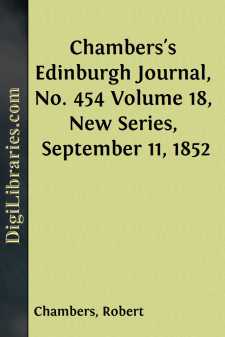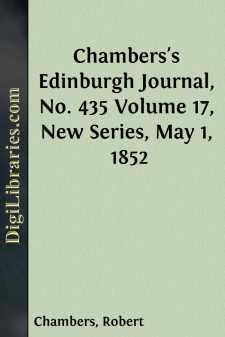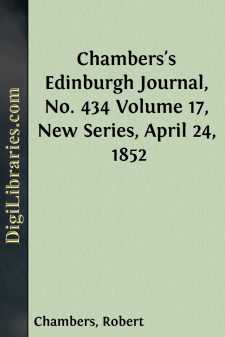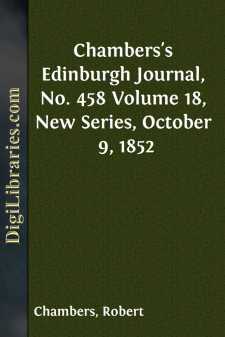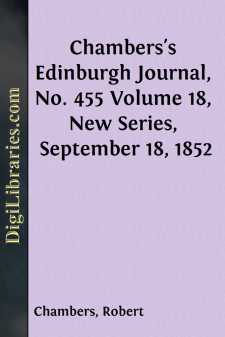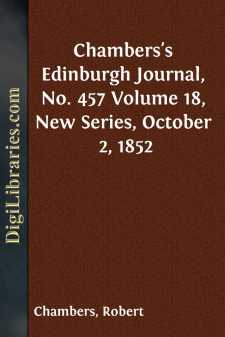Categories
- Antiques & Collectibles 13
- Architecture 36
- Art 48
- Bibles 22
- Biography & Autobiography 813
- Body, Mind & Spirit 142
- Business & Economics 28
- Children's Books 17
- Children's Fiction 14
- Computers 4
- Cooking 94
- Crafts & Hobbies 4
- Drama 346
- Education 46
- Family & Relationships 57
- Fiction 11829
- Games 19
- Gardening 17
- Health & Fitness 34
- History 1377
- House & Home 1
- Humor 147
- Juvenile Fiction 1873
- Juvenile Nonfiction 202
- Language Arts & Disciplines 88
- Law 16
- Literary Collections 686
- Literary Criticism 179
- Mathematics 13
- Medical 41
- Music 40
- Nature 179
- Non-Classifiable 1768
- Performing Arts 7
- Periodicals 1453
- Philosophy 64
- Photography 2
- Poetry 896
- Political Science 203
- Psychology 42
- Reference 154
- Religion 513
- Science 126
- Self-Help 84
- Social Science 81
- Sports & Recreation 34
- Study Aids 3
- Technology & Engineering 59
- Transportation 23
- Travel 463
- True Crime 29
Chambers's Edinburgh Journal, No. 454 Volume 18, New Series, September 11, 1852
by: Robert Chambers
Description:
Excerpt
MONETARY SENSATIONS.
The poorest and most unlucky dog in the world either has or had some small portion of money. No matter how small, how hardly, or how precariously earned, he has seen, from time to time, a glimpse of the colour of his own cash, and rejoiced accordingly as that colour was brown, white, or yellow. It follows, therefore, that even the poorest and most unlucky dog in the world has experienced monetary sensations. It may appear paradoxical, but it is no less true, that it is the very rich, born to riches, the heirs to great properties, or no end of consolidated stock, who have never enjoyed or feared the sensation to which we allude. To them, money is a thing of course; it pours in upon them with the regularity of the succeeding seasons. Rent-day comes of itself, and there is the money; dividend-day is as sure as Christmas, and there lie the receipts. These are the people who know nothing of the commodity with which they are so well endowed, or, at most, their knowledge is but skin-deep. They take and spend, just as they sit or walk. Both seem natural processes; they have performed them since they were born. Their money is a bit of themselves—an extra and uncommonly convenient limb with which they are endowed. It is only when some sudden catastrophe bursts upon and cuts off the supplies, that this class of ladies and gentlemen experience, like the shock of a thousand freezing shower-baths, their first 'monetary sensation.'
But the men and women who work either with head or hands—who fight their way—who plan to gain and plan to spend, so that the latter shall counterbalance the former—who lie sleepless in their beds, intent on how to make both ends meet—who are lucky and unlucky—who travel the ups and the downs of life, here grasping fortunes, there turning out the linings of penniless pockets: these are the people whose whole lives are one long succession of monetary sensations. Among them mainly is cultivated the art of looking at two sides of a shilling. They know how to value half-crowns and sovereigns in calling up the long arrear of hard-worked hours, which are, as it were, the small-change of quarters' salaries and weeks' wages. How many strokes of the steady-going pen are encircled in those bright yellow disks—how many thumps of the ponderous hammer has it taken to produce this handful of silver. Or on a larger scale—as the successful speculator sweeps to himself the mass of notes and bills, all as good as gold, for which he has set every penny of his worldly means upon the stake, and feels with a thrill which makes him clutch the precious paper, that had things not turned out as, thank Heaven! they have, that then, and then!—--He has had a tolerably vigorous monetary sensation.
But the whole of the money-getting classes, and, to some extent, the classes who merely spend what others got and gave them, can look very well back upon a series of monetary sensations which have marked epochs in their lives....


